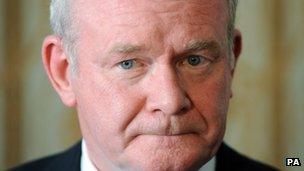McGuinness says Claudy bombings were 'indefensible'
- Published

Martin McGuinness said the bombings were appalling
The Deputy First Minister of Northern Ireland, Martin McGuinness, has said the Claudy bombings of 1972 were "indefensible and appalling".
Tuesday marks the 40th anniversary of the IRA bombings in which nine people were killed.
The Sinn Fein minister said the deaths and injuries were wrong and should not have happened.
He said they should motivate "everyone in our society to ensure such terrible tragedies never happen again".
"Today marks the anniversary of Claudy," Mr McGuinness said.
"It is also the 40th anniversary of two unarmed young men from Creggan in Derry who were shot by the British Army.
"Last week it was Bloody Friday. Next week is the anniversary of the killing of 19 people in Ballymurphy during internment week.
"It is my firm view that we need to find a better way of dealing with the legacy of the conflict which goes beyond individual acts of commemoration or remembrance and begins to deal with the very real hurt that exists throughout our society."
Mr McGuinness, a former IRA leader, said "all of the families of those who died or were injured deserve and are entitled to the truth about the deaths of their loved ones".
"We must collectively increase our efforts to heal the deep hurt caused by the Claudy bombings and all of the suffering in 1972, and continue to build on the progress of our peace process," he added.
Mr McGuinness has been criticised by Ulster Unionist security spokesman Tom Elliott.
"Martin McGuinness has rightly called the attack 'indefensible and appalling' but this means little when it is followed up by seeking equivalence for these IRA murders with the actions of the British Army who were seeking to combat that threat.
"To use the anniversary of what happened at Claudy as a means to attempt to revise history is shocking and certainly insensitive to victims' families," he said.
The Claudy bombings of 31 July 1972 were among the worst atrocities of the Northern Ireland troubles.
In 2010, a Northern Ireland police ombudsman's report said detectives had concluded that the late Fr James Chesney, who was later moved to the Irish Republic, was a suspect.
It said the police, the state and the Catholic Church had covered up Fr Chesney's suspected role in the bombing.
No action was ever taken against Fr Chesney, who died in 1980.
Northern Ireland Secretary Owen Paterson said that the government was "profoundly sorry" that Fr Chesney had not been properly investigated.
Both Protestants and Catholics were killed in the Claudy blasts.
The youngest victim was eight-year-old Kathryn Eakin who was cleaning the windows of her family's grocery store when the first bomb exploded.